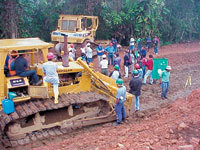Oil country hot line
Apr. 2002 Vol. 223 No. 4 Hot Line UK stiffens North Sea licensing rules To encourage
UK stiffens North Sea licensing rules To encourage oil firms to further exploit North Sea fields’ remaining production capacity, the United Kingdom has actualized new investment rules for such licenses. These rules set new investment deadlines on existing licenses, make trading licenses between companies less complex and set shorter investment deadlines in new concessions. Also, E&P licenses will be deemed "fallow" if no activity has taken place for four years. These demanding conditions are being instituted to force companies to invest, or else lose existing licenses to other (smaller) investors. Energy Minister Brian Wilson estimates that Britain has 250 fallow discoveries and another 200 unused licenses. New licenses in this year’s 20th round will have two four-year initial terms, with a 50% relinquishment after the first period. They will only run to the third 18-year term if a development plan is approved. MMS poses nine industry standards for FPS MMS has published a Notice of Proposed Rulemaking on floating production systems (FPSs) to include by reference in MMS regulations, eight API standards and one American Welding Society standard. The inclusion will enhance the U.S. agency’s ability to permit floating offshore platforms that have not been specifically covered under its existing regulations. MMS Associate Director for Offshore Minerals Management, Carolita Kallaur, said, "These specific standards were identified as critical to the continued success of deepwater developments that rely on FPSs." Execs protest Venezuelan decisions PDVSA’s newly appointed president, Gaston Parra, denied that employees would strike to protest the appointment of a new management board by Venezuelan President Hugo Chávez. More than 30 executives and three former vice presidents placed a newspaper advertisement in El Nacional in protest. The ad stated, "It’s unacceptable that people who historically have been enemies of this institution . . . can be named to top positions for ideological reasons or personal interest." The executives claim that the new leadership decision is based on politics, not merit, and it signals more government control over the firm. Nabors buys Enserco in ‘friendly’ deal Nabors Industries has joined its U.S.-based rivals in expanding on the Canadian natural gas front via its acquisition of Enserco Energy Service for more than C$400 million ($252 million). Nabors is offering C$15.50 per Enserco share in cash, or exchangeable shares in a Nabors subsidiary, and interest at an annual rate of 6% until the deal’s completion. Nabors said it would require at least two-thirds of Enserco’s stock being tendered to its offer and a shareholder vote. CEO Gene Isenberg said the deal was driven partly by the expansion of Nabors’ major customers in Canada in recent years. He said, "Enserco’s assets are relatively new, in excellent condition and well suited for the increasingly important role that Canada is playing in the North American natural gas supply picture." Indonesian well explodes; villagers evacuate State firm Pertamina said a gas well blowout in central Java could cause losses totaling many millions of dollars. The fire destroyed the firm’s rig, demolished nearby crops and forced the evacuation of more than 1,000 villagers. The blowout occurred at the RBT 1 well in Cepu and was allegedly caused by a BOP that was unable to tolerate the pressure when gas suddenly emerged from an interval at 9,512 ft. Pertamina spokesman Ridwan Nyak Baik said measures have been taken to stop the blowout, primarily by direct capping, which is expected to be completed in three to four weeks. A contingency plan is in place to drill two wells to inject mud to stop the gas flow from the well. TotalFinaElf brings K1A field onstream The second-largest operator in the Netherlands, TotalFinaElf, has solidified its position in the area by bringing the K1A gas field onstream. Located in the Dutch sector of the North Sea, the unmanned production platform is equipped with a gas separation and processing unit, from which output is exported to the Balgzand terminal at Den Helder nearly 150 km (93 mi) southeast of the field. Field development is ongoing, and production of about 20,000 boed is expected by mid-2003. Petrobrás appeals court ruling Petrobrás released a statement saying it would appeal a $180-million court award to the Rio de Janeiro Fishermen Federation, which represents the region’s fishermen affected by the 340,000-gal oil spill into Guanabara Bay. Petrobrás was originally fined $30 million for the spill that was caused by a ruptured pipeline in 2000. The firm said it plans to appeal, primarily because it has already paid $2.8 million to nearly 10,000 fishermen, and has distributed food to them after the spill. Court officials said the fishermen want additional compensation.
Pipeline protest in Ecuador leaves one dead Ecuador’s government has agreed to allow lawmakers to mediate an end to pipeline building protests that have restrained oil output, and have led to one demonstrator being killed. Demonstrators had seized oil wells and blocked highways to demand more development funds and better electricity services. Following a shooting incident, a four-party team of legislators from diverse political affiliations (chosen by protestors and approved by the government) is striving to find solutions that address a lack of basic services in the provinces.
|
- Applying ultra-deep LWD resistivity technology successfully in a SAGD operation (May 2019)
- Adoption of wireless intelligent completions advances (May 2019)
- Majors double down as takeaway crunch eases (April 2019)
- What’s new in well logging and formation evaluation (April 2019)
- Qualification of a 20,000-psi subsea BOP: A collaborative approach (February 2019)
- ConocoPhillips’ Greg Leveille sees rapid trajectory of technical advancement continuing (February 2019)



